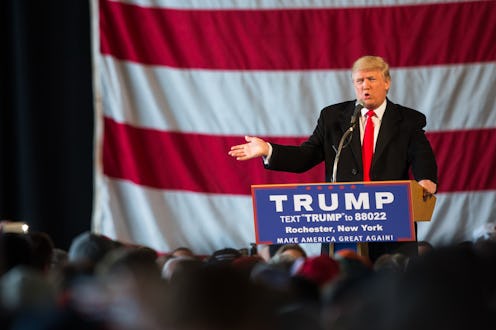News
How Will RNC Rule 40B Affect Donald Trump?
The talk of a contested Republican National Convention has pervaded the media and the political community for just over the past month, since Donald Trump's dwindling lead could mean he may not get the required 1,237 delegates. If he doesn't reach that magic number, a contested convention could occur — assuming that neither Ted Cruz or John Kasich somehow become the frontrunner — in which attendees will vote on the candidates until a nominee is selected. However, a little rule called 40(b) could work in Trump's favor or hurt him, dramatically changing the course of the Republican National Convention.
To impart a bit of history, this rule, which was pushed through the Rules Committee as recently as 2016, states that a Republican candidate must win a majority of the delegates from eight states before that candidate can qualify for the nomination. It's a bit like entering the Goblet of Fire at Hogwarts, where a student has to reach a certain year before he or she can join in the competition — but I digress. Anyway, this rule was enacted back in 2012 when Mitt Romney was considering a re-bid for the presidency, since previously, candidates only had to win a plurality of the delegates from five states. Thus, this mixes things up for the 2016 candidates.
Interestingly, the new rule was pushed by Romney's people as a means to winnow out Ron Paul from also trying to do the same thing — that is, re-bid for the nation's most executive office. The rule's jump from a plurality of five to a majority of eight states made it so that a winner of eight or more could qualify for a run-off should a contested convention occur. So yes, Romney made some serious moves in his attempts for the White House, having gone so far as to persuade the Republican National Committee to alter convention law for his own benefit. Read on, as the actual law is quite clearly there to mess someone's game up:
Each candidate for nomination for President of the United States and Vice President of the United States shall demonstrate the support of a majority of the delegates from each of eight (8) or more states, severally, prior to the presentation of the name of that candidate for nomination.
Boom. More recently, in the race between Trump, Cruz, and Kasich, since delegates were awarded proportionally prior to March 15, candidates without eight states' delegate majorities are much less likely to reach that number. This could actually lead both Trump and Cruz toward the nomination, as they are the only two candidates to have secured a majority of delegates in over eight states — Trump in 20 (New Hampshire, South Carolina, Nevada, Alabama, Arkansas, Georgia, Massachusetts, Tennessee, Vermont, Virginia, Kentucky, Louisiana, Hawaii, Michigan, Mississippi, Illinois, North Carolina, Florida, Missouri, and Arizona) and Cruz in 10 (Iowa, Alaska, Oklahoma, Texas, Kansas, Maine, Idaho, Wyoming, Utah, and Wisconsin). Essentially, this means that unless Kasich can achieve an eight-state majority, the contested convention will consist of Trump and Cruz.
Now that the whole contested convention idea could become a little more competitive, the games are on. At this point, it's Trump to the 1,237, or a race to the very finish with Cruz. Just don't expect him to back down, since it's pretty obvious that Trump likes a good competition — as long as he's the winner.
